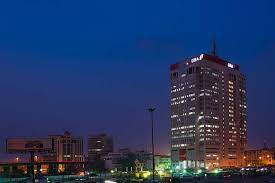United Bank for Africa (UBA) Plc says it will continue to provide access to finance to boost Nigerian Small and Medium Enterprises (SMEs) representation in international markets and economies.
Prince Charles Ayewoh, the Group Head, Retail, Product and Sales, UBA, made the assertion at the 2023 Lagos International Trade Fair (LITF) on Friday in Lagos.
The event organized by the Lagos Chamber of Commerce and Industry (LCCI) had as its theme: “Connecting Businesses, Creating Value.”
Ayewoh stated that ample evidence showed that SMEs with high-growth potential required early access to international markets to ensure their development and growth.
He noted that while generally SMEs report increased international business contacts in recent years, Nigerian SMEs, remain, overall, under-represented in the international economy and change in this respect was slow to happen.
“For example, while SMEs typically contribute around 50 per cent of Gross Domestic Product (GDP) and 60 per cent of employment in national or local economies, most evidence suggests they contribute only about 30 per cent of exports, and even less of international investment.
“Inadequate support for MSMEs often affects youths and women disproportionately, making it more difficult for them to become successful entrepreneurs.
“For instance, there are significant gender differences in SMEs access to finance, in particular, in developing countries.
“In our desire to encourage enterprises and entrepreneurship, we must not lose sight of the need to carry every single stakeholder along in our noble objective to effectively lift businesses in Africa to unprecedented heights,” he said.
Ayewoh said the bank had been supporting the LITF since 2019 in recognition of the priceless roles played by SMEs in advancing economies globally.
He said the bank would not relent in providing far reaching expert advice that empower SMEs to go ahead and become global champions.
He added that the bank’s extensive spread across Africa and other major economies of the world positioned it on the lookout for partnership opportunities to benefit the business environment and economies where they operate.
“Indeed, in developing and developed countries alike, MSMEs are among the most effective tools to empower youth and women. They are key allies in implementing the 2030 Agenda and achieving the SDGs.
“Yet, in spite of these remarkable contributions, the lack of adequate finance for MSMEs often prevents them from reaching their full potential as more than 200 million MSMEs in developing countries lack adequate financing.
“Access to adequate capital is an important condition for promoting entrepreneurship, enterprise formation, sustained economic growth, job creation and productive investment.
“Initiatives to enhance access to finance for MSMEs need to go hand in hand with efforts to enhance skills and know-how across enterprises, to promote research and development and to put in place enabling infrastructure such as telecommunications, roads, power and ports.
“MSMEs also need compliance support and management resources to compete globally, to be part of global supply chains, and to grow into stronger enterprises,” he said.
Ayewoh also commended the LCCI’s vision to transform the fair to become one of the major attractions of trade in Africa when it comes to SMEs attendance across the continent.
He said since its inception, the fair had grown to become the largest trade show in sub-Saharan Africa and had attracted both national and international entrepreneurs from over 1,600 companies all over the world.


